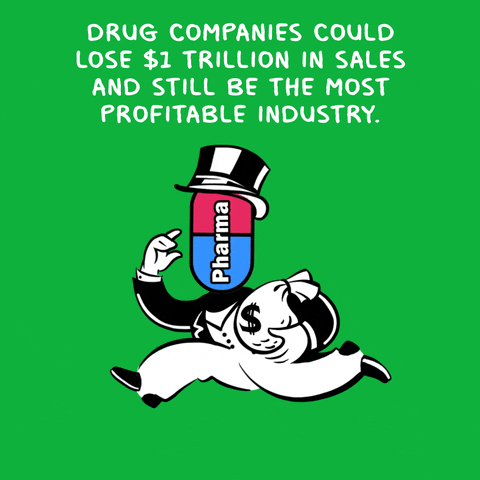
Quick Read:
CBD’s Real Benefits: Scientific research supports CBD’s effectiveness in managing chronic pain, anxiety, and inflammation. The FDA approved Epidiolex, a CBD-based medication for epilepsy, highlighting CBD's medical potential.
Big Pharma’s Fear: CBD threatens the pharmaceutical industry because it offers a natural alternative to expensive, often addictive medications. There’s speculation that Big Pharma may downplay CBD’s efficacy to protect their profits.
Placebo Effect Debate: While some argue CBD's effectiveness could be a placebo effect, clinical trials show CBD often outperforms placebos in pain and anxiety relief.
Convenient Fad Narrative: Skeptics focus on the lack of long-term research, but Big Pharma benefits from this narrative, keeping competition at bay while dismissing CBD as a temporary trend.
The Future of CBD: As research continues, CBD’s potential in treating neurodegenerative diseases, providing anti-inflammatory benefits, and serving as a therapeutic tool is growing.
The Science Big Companies Don’t Want You to Know
For years now, CBD has taken the wellness world by storm, with enthusiasts claiming its benefits for everything from pain relief to anxiety management. But with the rise of CBD’s popularity comes the inevitable backlash: "Is CBD just a fad?" Critics argue that the hype surrounding this cannabinoid will soon fade, likening it to other wellness trends that come and go, like charcoal detoxes or superfood crazes.
But is that really the case? Or is there a deeper reason why some industries are pushing the "CBD is a fad" narrative?

The Science Speaks: CBD’s Real Benefits
Despite the skepticism, CBD has a growing body of scientific research to back up many of its claimed benefits. For example, studies have demonstrated that CBD can help manage chronic pain, reduce inflammation, and even alleviate anxiety.
Most notably, the FDA approved Epidiolex, a CBD-based medication, for the treatment of certain types of epilepsy. This FDA stamp of approval lends significant credibility to the idea that CBD is more than just a wellness trend—it’s a legitimate therapeutic compound.

Big Pharma's Fear of Disruption
One reason the "fad" narrative persists is that CBD poses a direct threat to the pharmaceutical industry. Big Pharma stands to lose billions if CBD, a natural and widely accessible product, can replace their expensive medications. Think about it: why would people pay for addictive opioids or anti-anxiety pills if CBD can offer relief without the harmful side effects?
It’s not far-fetched to consider that pharmaceutical giants may be funding campaigns that downplay the efficacy of CBD. Lobbying efforts have long kept cannabis out of mainstream medicine, and CBD could be the next battleground.
The FDA approved Epidiolex, a CBD-based medication, for the treatment of certain types of epilepsy. This FDA stamp of approval lends significant credibility to the idea that CBD is more than just a wellness trend—it’s a legitimate therapeutic compound.
The Placebo Question: Is It All in Our Heads?
Critics argue that much of CBD’s effectiveness can be chalked up to the placebo effect. While the placebo effect is real, there’s evidence to suggest that CBD isn’t just working because people "believe" in it. In randomized controlled trials, CBD has often outperformed placebos, particularly in areas like pain management and anxiety relief.
The placebo effect may account for a portion of the benefits some users feel, but the science indicates there’s much more at play.

Why the Fad Narrative May Be Convenient for Some 💰
Skeptics often point out that there isn’t enough long-term research to fully validate all of CBD’s benefits. While this is true, it’s also worth noting that Big Pharma benefits from this lack of data. If they can dismiss CBD as a fad, they can continue pushing their patented drugs with fewer natural competitors.
Moreover, the wellness market has its fair share of snake oil salesmen, which can add fuel to the skepticism. Many products marketed as CBD contain little to no actual cannabidiol, creating a "Wild West" scenario that allows critics to lump all CBD products together.

What the Future Holds for CBD
As more research is conducted, we’re likely to see even more compelling evidence for CBD’s long-term benefits. Early studies suggest that CBD could have neuroprotective properties, help with neurodegenerative diseases, and even serve as an anti-inflammatory agent. While the long-term effects are still being studied, the early signs point toward CBD becoming a fixture in both wellness and mainstream medicine.
Fad or Future? 🦾

So, is CBD just a passing trend? While the wellness world is full of temporary fads, the science surrounding CBD suggests that it’s here to stay. As more research is conducted and more people experience its benefits firsthand, the notion that CBD is just a fleeting trend will likely fade— unlike the lasting impact CBD could have on medicine and wellness.
The real question may not be whether CBD is a fad, but whether certain industries are afraid of what this "fad" might turn into: a natural, affordable alternative to their high-priced pharmaceuticals…….
and they don’t want that!
Keep it breezy and hazy! 💚

